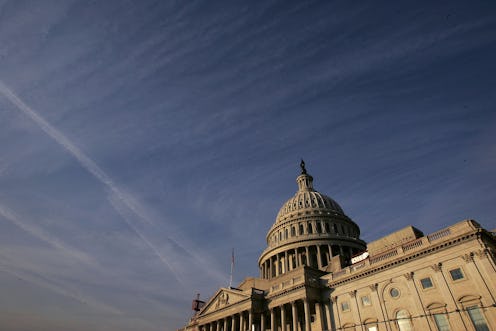News
The States Still Left To Vote In The Primaries
The end of the presidential primary process is almost in sight, with front-runners Donald Trump and Hillary Clinton going full steam ahead. So, which states are left to vote in the primaries? Now's your chance to check out which states still have to make their voices heard, and which delegates are left for the taking. There are a grand total of 1,016 elected delegates left to capture on the Democratic side and 214 left on the Republican side, with California being responsible for the bulk of the delegates left up for grabs for both parties. From a geographic perspective, it's a mixed bag.
There is still most of the West Coast that has yet to vote, although voting has already begun in Oregon, thanks to the vote-by-mail system has already out ballots and candidate information sheets to all registered voters. The Dakotas will be casting their votes too — with North Dakota Republicans being the exception — as the process winds down as well.
Polling for these contests is pretty sparse for now. There can be strategic advantages to not commissioning slews of public polls in a close race before an election, but in some of these contests, geographical considerations are coming into play too.
Kentucky
Democrats will be holding a closed primary in Kentucky on May 17. The state's Republican party held elections earlier this year, also on March 5.
Oregon
Voters on both sides of the aisle in the Beaver State have to have their vote-by-mail ballots turned in to a ballot drop box by 8 p.m. PT on May 17. The Secretary of State's office in Oregon facilitates the vote-by-mail system, where they have one of the highest voter turnout rates in the country.
Washington
Republicans in the Evergreen State will also be participating in a vote-by-mail primary which ends on May 24. Ballots have already started arriving in mailboxes. Delegates from the Democratic Party are still in the process of convening congressional district caucuses, scheduled for May 21, where delegates to go on to the DNC in Philadelphia will be decided.
Virgin Islands
Democrats in the Virgin Islands hold their closed caucuses on June 4, where seven of the state's 12 total delegates will be assigned to either Hillary Clinton, or Bernie Sanders, based on the outcome of the caucus. Currently, both camps also have one superdelegate each already committed to their side, with three still undecided.
Puerto Rico
Puerto Rico's 60 elected delegates to the Democratic National Convention will be at stake on June 5, in a open primary process. Republicans already had their primary in March.
California
California's Democrats and Republicans will vote on June 7 in a semi-closed and closed primary contest, respectively. The Golden State holds a treasure trove of delegates for both parties, but for Democrats this state has the potential to spoil former secretary of state's presidential aspirations if Sanders supporters come out in large numbers and capture enough of the 475 elected delegates to go on.
Montana
Democrats in Montana will hold an open primary on June 7, but on the GOP side the ballot will be closed. This also will be an interesting race to watch, and may serve as a useful measuring stick to suss out the relative popularity of Bernie Sanders over that of Donald "Tiny Hands" Trump if there is a bump in expected voter turnout on the Democratic side. Watch the numbers carefully.
New Jersey
The Garden State goes to the polls on June 7 as well. Republicans and Democrats will both hold semi-closed primaries, which means that same-day registration is possible. This, like Montana, will be another state to watch to see who would be the stronger Democratic candidate to square off against He-Who-For-The-Love-Of-All-That-Is-Holy-Should-Not-Be-Named.
New Mexico
Democrats and Republicans vote on June 7, too, in what may go down in history as the "Thank The FSM It Is The Last Super Tuesday And Where Is My Gin & Tonic Please, And Thank You" primary. Democrats are sending 34 elected delegates to Philly and nine superdelegates, while Republican votes have 21 out of 24 total delegates to pick from.
North Dakota
The final caucus on the Democratic side will take place on June 7 in North Dakota. It's an open caucus, which means that Independents and unaffiliated voters who haven't cast ballots on the GOP side will be eligible to participate in the caucus process, so not just registered Democrats will be voting. This will definetly be a race to watch. If, like in Montana, turnout is higher than average, or higher than predicted, it will spell good news for the Sanders camp.
South Dakota
Voters from both parties will go to the polls on June 7. For the GOP, the contest is set up as closed-primary, winner-take-all for the 26 elected delegates, but the RNC, like always, will pick three of their own. Democrats have a semi-closed primary for the 20 elected delegates out of 25 total who will represent the state.
Washington, D.C.
Democrats in Washington, D.C. will have 20 elected delegates to appoint on the final day of voting before the impending chaos of convention season on June 14. The entire contingent to the DNC will number 46, due to the addition of a whopping 26 superdelegates. Interestingly, Washington, D.C. will be the only area represented at the DNC with a larger superdelegate faction than elected delegate faction.
With primary season finally almost over for good, there will be but a brief respite before the conventions roll around. But due to the ongoing fight in both mainstream parties to control their radical, populist other halves, the lead up to the conventions will probably be just as fraught with intrigue and drama as the primary season itself was. Watch for who gets put on the Rules committees, and keep tabs on which party big wigs happen to be switching sides, or changing their tune. Anything can happen.
